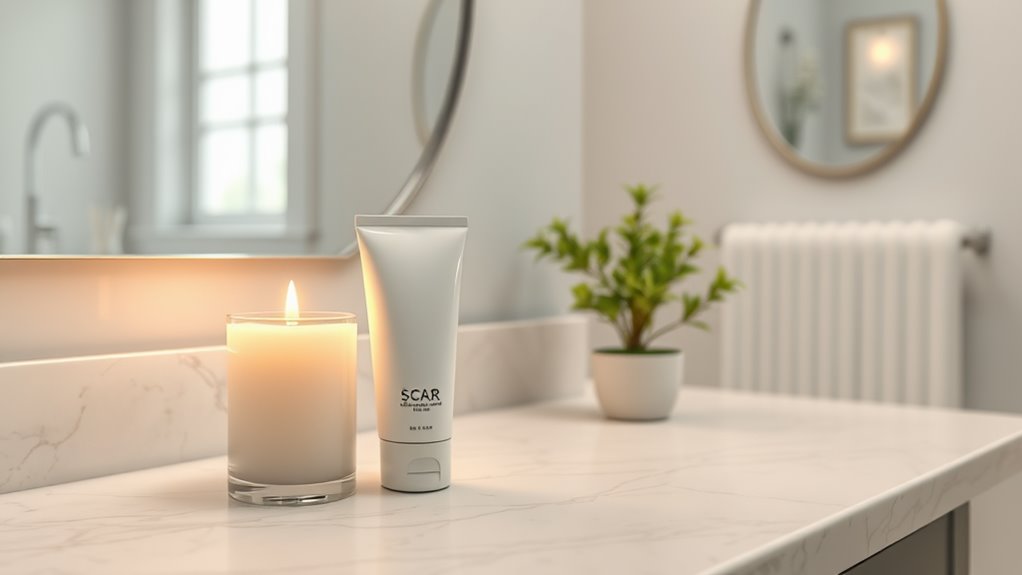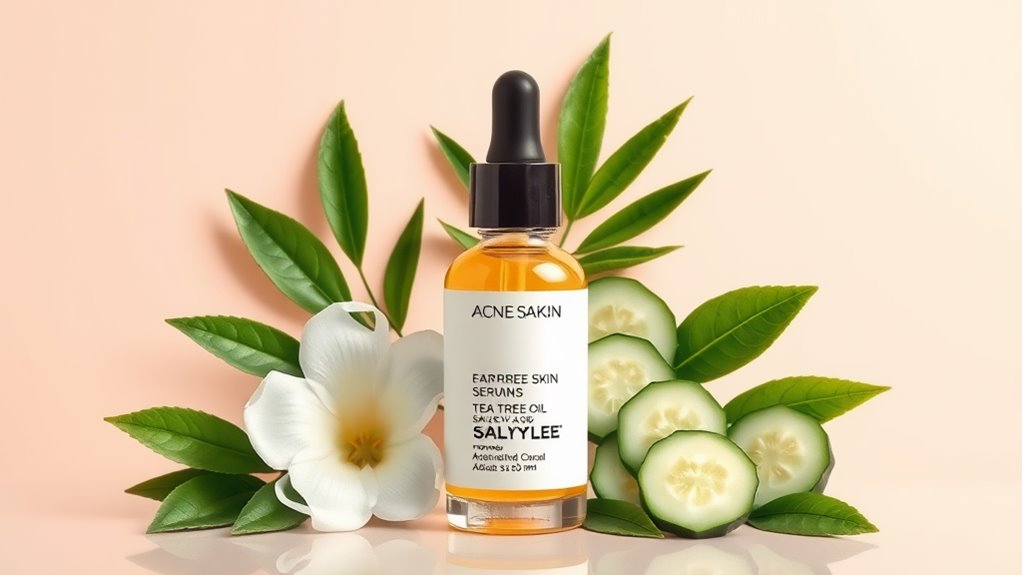Calm Irritated Skin With These Easy Tips
Irritated skin can be frustrating and uncomfortable, but you don’t have to struggle with it. By understanding the triggers and implementing a gentle skincare routine, you can greatly calm your skin. From choosing the right cleansers to incorporating soothing ingredients, there are simple strategies that can help. Want to know what steps to take next and how to make lasting improvements? Let’s explore these effective tips together.
Key Takeaways
- Use mild, non-irritating cleansers and lukewarm water to reduce irritation while maintaining skin’s natural oils.
- Apply a soothing moisturizer that is fragrance-free and hypoallergenic to keep skin hydrated.
- Incorporate calming ingredients like aloe vera and chamomile into your skincare routine for relief.
- Practice stress management techniques such as mindfulness or yoga to help reduce skin sensitivity.
- Stay hydrated by drinking plenty of water and consume nutrient-rich foods to support overall skin health.
Understand the Causes of Irritated Skin
When you experience irritated skin, it’s essential to understand what’s causing the problem. Common culprits include environmental factors, allergens, and harsh skincare products. If you have sensitive skin, even minor irritants can trigger a reaction, making sensitive skin care vital.
Take a closer look at your environment; pollutants, extreme temperatures, and sun exposure can all contribute to irritation. Additionally, certain fabrics, soaps, or fragrances may aggravate your skin.
Stress and hormonal fluctuations can also play a significant role in skin sensitivity. To master sensitive skin care, identify these triggers and adjust your routine accordingly.
Keep a journal of your symptoms and potential irritants to help pinpoint the cause, paving the way for more effective skin management strategies. Moreover, improper application of eye care products can lead to further irritation, emphasizing the importance of using the right techniques for sensitive areas.
Gentle Cleansing Techniques
When it comes to cleansing irritated skin, using mild cleansers is key to preventing further irritation.
Hot water can strip your skin of its natural oils, so stick to lukewarm water instead.
Use Mild Cleansers
Choosing the right cleanser can make a significant difference for irritated skin. You’ll want to opt for mild, non-irritating formulas that effectively cleanse without stripping your skin’s natural barrier.
Here are some key features to look for:
-
Fragrance-free: Avoid added scents that can exacerbate irritation.
-
Soap-free: Choose liquid cleansers that won’t disrupt the skin’s pH balance.
-
Hydrating ingredients: Look for glycerin or hyaluronic acid to maintain moisture.
-
Hypoallergenic: Verify the product is designed for sensitive skin to minimize reactions.
-
Dermatologist-tested: Trust products backed by professionals to guarantee safety and efficacy.
Avoid Hot Water
Hot water might feel soothing, but it can actually aggravate irritated skin by stripping away natural oils and increasing redness. Instead, opt for lukewarm water when cleansing your face or body. This temperature helps maintain your skin’s moisture barrier while effectively removing impurities.
When washing, use gentle, circular motions with your fingertips rather than harsh scrubs or washcloths. This reduces friction and irritation. Follow up with a mild, hydrating cleanser to guarantee you’re not further compromising your skin’s integrity.
After cleansing, pat your skin dry with a soft towel—don’t rub! This technique minimizes irritation and helps retain moisture.
Natural Remedies for Soothing Skin
When your skin feels irritated, natural remedies can be a game-changer.
Herbal compress applications and essential oils offer soothing benefits that can calm your skin effectively.
Let’s explore how these remedies can help you find relief.
Herbal Compress Applications
If you’re looking for a natural way to soothe irritated skin, herbal compress applications can be a great option.
These compresses harness the healing properties of various herbs, providing targeted relief and promoting skin health. Here’s how to make the most of them:
-
Chamomile: Known for its calming effects, perfect for redness and irritation.
-
Lavender: Offers anti-inflammatory benefits, helping to reduce swelling and discomfort.
-
Calendula: Promotes healing and helps with cuts, scrapes, or rashes.
-
Green tea: Rich in antioxidants, it soothes and protects your skin.
-
Peppermint: Provides a cooling sensation, alleviating itching and irritation.
Essential Oils Benefits
Essential oils can be a powerful ally in your quest to soothe irritated skin. These concentrated plant extracts offer a myriad of benefits, from anti-inflammatory properties to skin-repairing abilities.
Lavender oil, for instance, not only calms redness but also promotes healing and relaxation. Tea tree oil is renowned for its antiseptic qualities, helping to prevent infection in compromised skin.
Chamomile oil can ease irritation and redness, providing a gentle touch for sensitive areas. To maximize their effects, dilute essential oils with a carrier oil, like jojoba or coconut oil, before application.
Recommended Skincare Products
Finding the right skincare products can greatly soothe irritated skin, so it’s important to choose items specifically formulated for sensitive types.
Look for products that prioritize calming ingredients and avoid harsh chemicals. Here are five recommended skincare products that can help you master your skincare routine:
-
Gentle cleanser: Opt for a sulfate-free formula that won’t strip your skin’s natural barrier.
-
Soothing toner: Choose one with chamomile or aloe vera to reduce inflammation.
-
Hydrating serum: Look for a serum containing hyaluronic acid to boost moisture levels.
-
Calming moisturizer: Select a fragrance-free, hypoallergenic cream for maximum comfort.
-
SPF protection: Use a mineral sunscreen to shield your skin from harmful UV rays without irritation.
Incorporate these into your regimen for best results.
Importance of Moisturizing
While many people underestimate the power of moisturizing, it plays an essential role in maintaining healthy, balanced skin. When you apply moisturizer, you create a barrier that locks in hydration and protects your skin from environmental stressors.
This is particularly vital for irritated skin, as it helps soothe inflammation and reduces redness. By keeping your skin hydrated, you enhance its elasticity and prevent dryness, which can lead to further irritation. Additionally, consistent moisturizing can help stop aging skin by providing essential nutrients that support skin health.
Choose a moisturizer that suits your skin type, whether it’s gel-based for oily skin or cream-based for dry skin.
Lifestyle Adjustments for Sensitive Skin
To effectively manage sensitive skin, you should consider making some lifestyle adjustments that can greatly reduce irritation.
These changes can enhance your skin’s resilience and overall appearance:
-
Choose breathable fabrics****: Opt for natural fibers like cotton to minimize irritation.
-
Limit hot showers: Use lukewarm water to prevent drying out your skin.
-
Avoid harsh soaps*: Select *gentle, fragrance-free cleansers to maintain your skin’s barrier.
-
Practice stress management****: Incorporate mindfulness or yoga to reduce stress, which can trigger flare-ups.
-
Stay hydrated: Drink plenty of water to support skin health from the inside out.
Implementing these adjustments can help you achieve smoother, calmer skin while reinforcing your commitment to a sensitive skin care routine.
Dietary Changes That Help
Making thoughtful dietary choices can considerably impact the health and appearance of your skin. Incorporating anti-inflammatory foods can help soothe irritation and promote a clearer complexion. Focus on hydrating with plenty of water and include essential fatty acids for ideal skin barrier function. Additionally, certain ingredients like scientifically-proven methods can aid in fading dark spots and enhancing overall skin tone.
| Food Type | Benefits |
|---|---|
| Fatty Fish | Rich in omega-3 fatty acids |
| Leafy Greens | High in vitamins and antioxidants |
| Nuts and Seeds | Provide healthy fats and zinc |
| Berries | Packed with antioxidants |
| Avocado | Moisturizing and nutrient-dense |
When to Seek Professional Help
Recognizing when to seek professional help for irritated skin is essential for effective treatment and long-term health. If you notice persistent issues or worsening conditions, it’s important to consult a dermatologist.
Here are some key indicators:
- Your irritation lasts longer than two weeks despite home treatments.
- You experience severe redness, swelling, or pain.
- You notice blisters or open sores that won’t heal.
- Over-the-counter remedies aren’t providing relief.
- You suspect an allergic reaction or skin infection.
Don’t hesitate to reach out for expert guidance. Early intervention can prevent complications and lead to more effective management of your skin concerns.
Frequently Asked Questions
Can Stress Contribute to Irritated Skin Conditions?
Yes, stress can definitely contribute to irritated skin conditions. When you’re stressed, your body releases hormones that trigger inflammation, making existing issues worse. Managing stress is essential for maintaining healthy, calm skin.
Is It Safe to Exfoliate Irritated Skin?
Exfoliating irritated skin can worsen your condition, so it’s best to avoid it until your skin heals. Focus on gentle cleansing and moisturizing instead, ensuring you protect and nurture your skin during this sensitive period.
How Does Weather Affect Skin Irritation?
Weather can greatly impact your skin irritation. Cold, dry air can strip moisture, while humidity might cause breakouts. You need to adjust your skincare routine accordingly to protect and soothe your skin effectively.
Can Hormonal Changes Trigger Skin Irritation?
Yes, hormonal changes can definitely trigger skin irritation. When your hormones fluctuate, it influences oil production and inflammation, leading to breakouts or redness. Staying aware of these changes helps you manage potential skin issues effectively.
Are There Specific Fabrics That Irritate Sensitive Skin?
Yes, certain fabrics like wool, synthetic fibers, and rough materials can irritate sensitive skin. You’ll want to opt for soft, breathable fabrics like cotton or bamboo, which are less likely to cause discomfort.
Conclusion
By adopting these simple tips, you can effectively calm your irritated skin and restore its health. Remember to choose gentle cleansers, incorporate soothing natural ingredients, and keep your skin well-moisturized. Don’t forget the importance of lifestyle adjustments and a balanced diet in supporting your skin’s well-being. If you notice persistent irritation or discomfort, don’t hesitate to seek professional help. With a little care and attention, you can achieve the calm, healthy skin you deserve.





